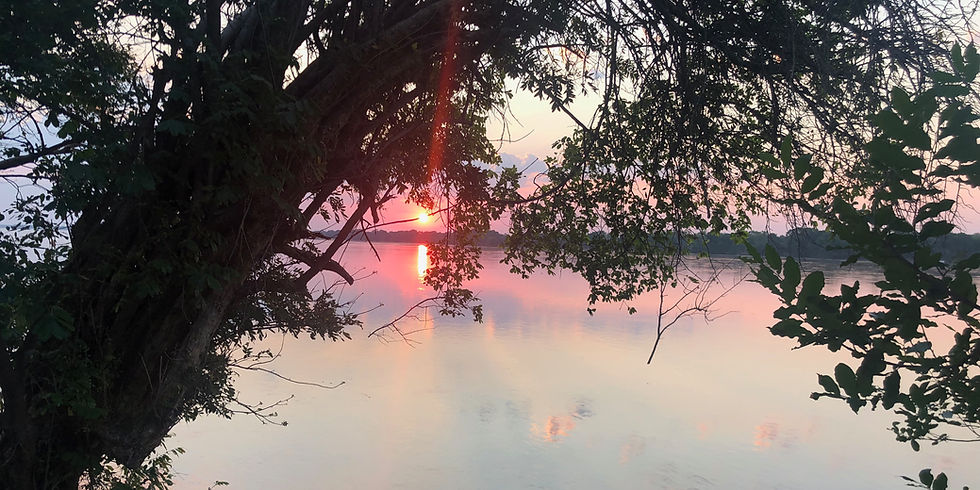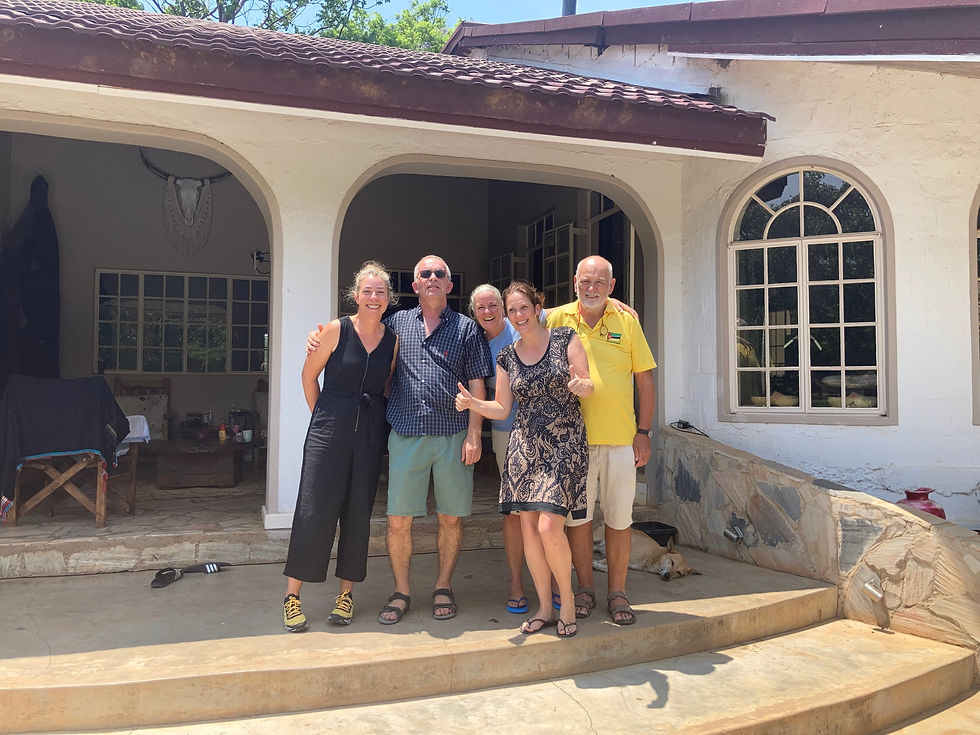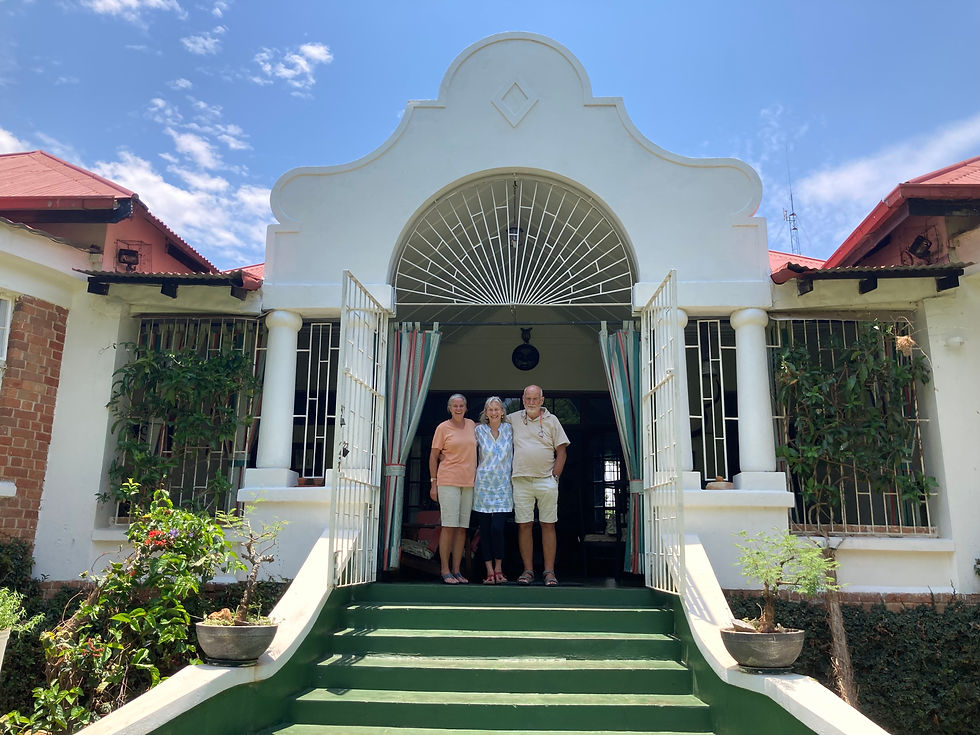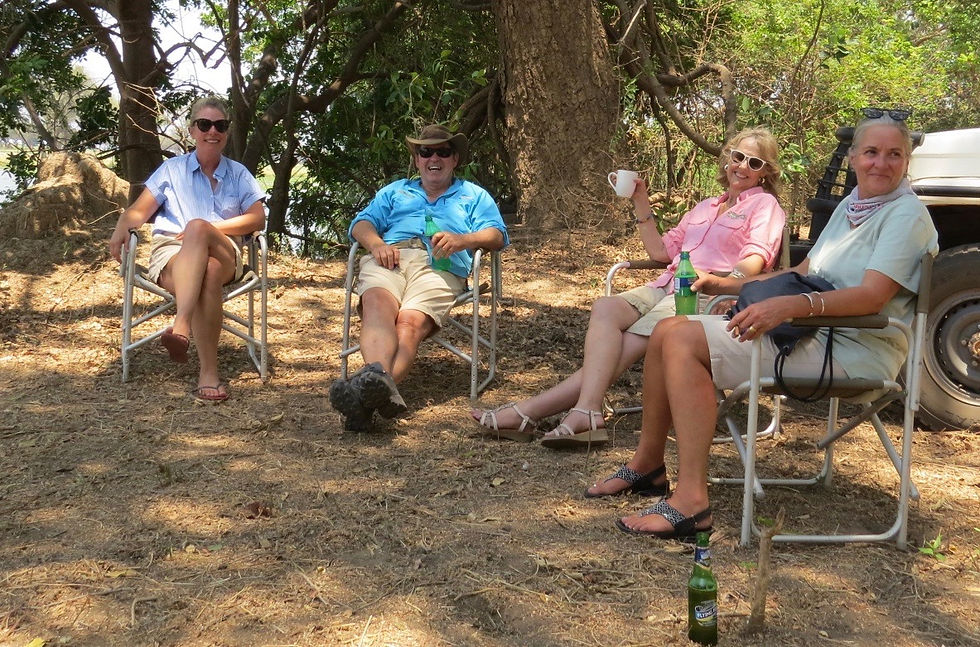
Once back in Kariba, on the border with Zambia, we were met by a nice medical gentleman only happy to carry out our required PCR in the Marineland harbour saving us the journey to his clinic. I should mention in Inhassoro the medics came the 70 km from Vilanculos to carry out the same service. Both very efficient, the test results in Kariba were ready within two hours. Much quicker than Europe and at less cost. Sometimes Africa can surprise you. Of course, there are far fewer tests being carried out in Africa along with many not yet offered the vaccination while the majority of people appear to be wary of even having it. To our surprise, there are still many people, of all races, who are Covid-19 deniers or anti-vaxxers in Africa.
“When someone is in denial, logical argument, even scientific proof, is not enough to change those individuals' minds. Just avoid trying to change their mind to retain your own sanity.” - Peter McSporran
Once tested, we set off for Harare to catch a flight all the way back to Lusaka the next day.
I should mention at Lions Den, where we always stop for a bacon or steak roll, when trying to pay, they informed me there was no electricity so the swipe card would not work. Rozanne did point out that their statement could not be true as the ceiling fan was perfectly functional above our heads. Equally being a butcher in an area with frequent power cuts there must be a generator. Not everyone outside Zimbabwe knows in that country there are a myriad of ways to pay. EcoCash, telephonic cash, local swipe card in local currency, foreign cards, transfer in RTGS, local cash, which is virtually unavailable or US$. Even change can be made in the form of smaller unwanted items such as chewing gum or sweets. The official rate is ZW$85 to US$1 while the unofficial rate varies from ZW$120 to ZW$190. Everyone wants US$! If they are short of US$ it is normal to declare the swipe function does not work, or alternatively, if they want to make money for themselves they claim the machine is not working. They then make a margin on the currency transaction, swiping themselves later and keeping the US$. Sometimes it is the business that is making the margin, often it is the staff member increasing his income. The chefs have been making millions over the years by getting foreign currency at the correct official rate from the Reserve Bank, selling it at the black market rate then buying more once again at the official rate. One of the easiest ways to become a millionaire in Africa, especially Zimbabwe. Easy to do when there are such huge variations. I am too stupid to understand how the system works, but it only works because huge margins are built into the cost of everything to hedge on the currency rate. For the rich, fine but annoying, for the poor, awful. I do wonder how tax returns are done?

Once in Lusaka, we were picked up by our reliable lady taxi driver Musenge who we have used for many years. She is dependable and always fair on her fares. Let me know if you would like her number? She dropped us at our friends, Geke de Jong and Harry Entjes house. Harry was in Holland when we arrived but Geke was delighted to see us. They now run a bed and breakfast from their large house along with a campsite. I am happy to say I gave them the idea as I did for Mona Moorcroft in Mozambique. It has become a successful business due to their flexible and welcoming manner. Geke still holds down a senior job in the tobacco industry.
The next day she lent us her Toyota Hilux, which in fact was ours until we sold it to her on leaving Zambia in 2017. We set off to Chisamba to visit a very dear friend, Cilla D’Elbee, where we caught up on old times in her Dutch gable house built way back in 1908. That is extremely old for this part of Africa. How these pioneers survived the diseases and hardships I do not know? No treatment or prophylactics for malaria and blackwater fever then. Storm was enchanted with the house and its memorabilia much about the early days in Northern Rhodesia. Cilla is a successful business lady, being one of the earliest macadamia producers in Zambia.

From there we set off to the new golf course and residential complex at Bonanza Park. When we first arrived in Zambia it was an active rose farm. There we met old Zimbabwean friends Ian and Daphne Lindsay. Ian had worked for me as a bachelor way back in the ’90s when I was at the CFU. In fact, he was the GM running the whole show for me. He was a bit wilder then, always hardworking and honest. I remember one Monday morning he arrived at work after somersaulting his little Datsun Pulsar a number of times on what used to be Lord Graham's farm. When we went to see the wrecked remains of his vehicle, we were astounded he survived, never mind having no visible physical damage on himself. He later worked for me again when we were in the throes of losing the farms and I was travelling back and forth from Zimbabwe to Zambia on a weekly basis. He returned a much steadier, responsible person with a wife, Daphne, and his two lovely daughters. Ian also moved to Zambia, farming on his own, but now working for one of Kevin James’s poultry businesses. He is also a cancer survivor who unlike me, is on continuous chemo treatment. He is a fighter always with a smile. Good luck Ian!

Also, at lunch were another of our good Zambian friends Nick and Sarah Dean. Nick’s family have also been in Zambia from the very early days. In fact, while we were living there we were asked to share his family’s centennial celebrations of being in Zambia. Nick is a very successful farmer, I would say the best crop farmer in Zambia who rebuilt the farming enterprise after the struggles of the ’90s where many commercial farmers failed in Zambia, leaving only a few survivors.
That evening Geke organised a ‘Bring and Braai’, which included Paul and Janet Golson, another old Zambian family, Dirk and Klaske Muijs, good Dutch friends of ours who are still cattle ranching there, although Dirk is better known for starting Livestock Services, a very successful farming co-op. He and Paul were also founders of Baobab School, the school our son Selby attended. Klaske and Paul for many years have been the backbone of the school. Also in attendance were Brett and Lynne Brannigan, ex Tengwe, who would later be our hosts at Mvuu Lodge on the Lower Zambezi. The Brannigan’s are very good friends of ours, having farmed in Tengwe then moved into the business world through forming The Genesis Group. Brett had a lot of foresight specialising in IT early on. His business empire now includes mining, tourism, computer services and refrigeration. A nicer couple you could not meet. Another wonderful evening with old friends.

Once down on the Zambezi at the Brannigan’s lodge, Mvuu, I had the indignity of watching Rozanne and Storm catch tigerfish while I had to be satisfied with vundu. Grrrr!
I did manage to catch a small tiger, no triumph here, only enjoyment of the wild and beautiful Zambezi shared with family and friends.
Classical War Training
After finishing basic training, we were then set to learn the art of war. This was split into two, Classical War, and COIN (Counter Insurgency). First classical war, which basically was about defending and attacking positions, including digging bloody trenches!
We had our numbers on the practical drills supplemented by what was known as the Demonstration Squad (Demo Squad). These were seasoned African troops with the experience of knowing how to drive fresh cadets insane. I often thought they may have been malcontents sent from their regular units, such as the RAR (Rhodesian African Rifles). The RAR were the successor to the Rhodesia Native Regiment (RNR) which fought in World War I from 1916 to 1918 and was granted battle honours earned by fighting in the East African Campaign, while in World War II they fought as the RAR in Burma. The Rhodesia Regiment (RR) was the oldest regiment of the country formed in 1899 having fought for Britain in both World Wars and many of its other campaigns including Aden (Yemen) and Malay. We were proud to be members of the Rhodesia Regiment despite not being too happy having been conscripted. Of course, the Brits did not consider us as long-time allies, rather insubordinate rebels.
I remember one day in training, command and control, resorting to Chilapalapa trying to get the demo soldiers to understand what I wanted them to do when I was admonished by our training officer Bruce Snelgar. He instructed me to speak English as they all understood this. Adding injury to insult our air cover bombed us with bags of flour. Accurately to our dismay. Not fun before another inspection that evening.
Charlie Mason was replaced by Colour Sergeant McKinley, a more humane instructor with a sense of humour. It did not deter him to push us night and day, including on the assault course, drill square or battle marches. The latter was always in full kit with weapons including a weighted backpack. For us, it was in winter so we were luckier than those summertime conscripts. Weapons were now introduced as was shooting. No earplugs or muffs then. Was it the shooting or landmines later on that damaged my hearing? We repeatedly had to strip our weapons and reassemble them until we could do it mechanically while blindfolded. Woe betide you if you called it a gun!
I do not know how many times we were told,
“This is my rifle this is my gun,
This is for killing, this is for fun!”
The shooting range was much more enjoyable than the physical stuff. Believe it or not, I really excelled with the MAG (machine gun). I could easily fire only two rounds, sometimes one at a time. For accuracy no long bursts with either the MAG or our automatic rifles both Fabrique Nationale (FN). Of course, MAGs in contact were most effective putting down heavy fire.
This newfound ability of mine was fine, except as the MAG became my designated weapon for the battle march which consisted of running a set distance with full kit, loaded rucksack, weapons and live ammunition. On finishing the run, the assault course was next and finally firing at specific targets on the range to attain a score. Of course, we all shared our loads on the battle march but in the end, I was lumbered with the MAG the most. Now the MAG was called a gun, unlike the mere rifle!
Other important classes were map reading, riot control, first aid, even how the army wanted us to write reports and requisitions.
We were allowed the occasional weekend off now, things were much more relaxed than basic training. As I played rugby that meant a Friday night off. Many a quick trip to Salisbury for one night scrounging a lift returning early the next day heading for a game in some mining town. Those miners were tough to play against on the baked African soil.
One incident, on a weekend which had no rugby fixtures, I recall it was a Sunday evening after meeting at the Jameson Hotel in Salisbury to travel back, we clambered into our car to be met with a loud explosion. Thinking someone had thrown a grenade, we debussed in awry to be met by hoots of laughter by our senior intake cadet course, 131, also returning to Gwelo. They had stuffed a lit thunder flash up our car's exhaust pipe. I remember one of the culprits was Lawry Rickards, maybe he can confirm this? Their laughter disappeared when armed plainclothes gentlemen arrived to investigate what was thought to be a potential terrorist incident. They arrived in what seemed like seconds, not minutes.
We were to learn that a major exercise in conventional war was to take place. It would include all the regular army units along with the airforce and all the conscripts in training. This meant once again our instructors were at pains to make sure we did not let them down. Serious preparation over and above our normal training.
The Cons to Traditional Land Tenure
The first I also deemed as a positive, that is it gives everyone a place to call home and somewhere to live if unemployed or retired. It allowed you if you were in a reasonable farming area with arable soils and good rainfall to grow crops, sure only limited designated areas. Also to keep a few cows, goats and hens. An owner of cows is considered wealthy. However, in doing so, this seems to remove any responsibility of the Government to put in place structures to deal with the unemployed or retired. Pensions are a pittance in Africa, even if you are able to access them. All pensions are eroded by inflation as I personally know.
Most of the employment in Africa is in the informal sector or as subsistence farmers, neither contributing to taxes or social security for their old age or health care. Of course, claims are made that health and education is free, it never is. There is always a cost or bribe required to access it.
“The existence of traditional land tenure reduces the pressure on an African Government to install meaningful social security.” – Peter McSporran
It also allows employment figures to be distorted with many claiming those with access to land are deemed subsistence farmers and therefore employed, although their annual income in most cases is well below the poverty level. Many rely on employed urban relations for their survival.
As tenure is generally in the man’s name, whatever he has on his death passes onto a male relative, often a brother. Yes, he also has to take on the wife, children, including all the family wealth generated in the marriage, this is all taken from the deceased family. No retained household wealth. Even when alive in many places there is no security of tenure on the land that the deceased once had, as it may be reallocated by the chief or council.
As pressure on the land increases, especially by those exceeding what is deemed their working life, crop yields drop and degradation becomes widespread. Just look out your aeroplane window on a clear day flying over Africa. People resort to natural resources for income including widespread charcoal making. Bill Gates mosquito nets are used to catch the smallest fingerlings in the rivers and streams while the wildlife disappears.
With no title, you cannot raise money for crop inputs or livestock or improvements on your dwellings. If you have no security of tenure let alone formal identification of the land through some form of authorised registration, what security can you offer to lenders? Title deeds are the best, but the issuance of these reduces the power of tribal leaders and politicians over the individual. For inputs, many rely on handouts from NGOs and Governments, the latter most likely to do so just before elections. If you are a member of the opposition, food aid and inputs are extremely hard to come by.
Of course, the community identifies with the land so when improvements such as boreholes, water pumps, maize mills, cattle dip tanks to name a few, are put in place, who is responsible for their maintenance? Joint ownership normally means no individual benefit or accountability so these soon fall into disrepair. How many times have I seen borehole units repeatedly arriving in an area to a great fanfare, much hand-clapping and shaking of hands to only be repeated by another benefactor in a few years? With joint ownership, it would appear anybody who wants to take charge, and if she/he does it successfully he/she is soon removed through local jealousy.
This is the main problem, which is exacerbated by the fact nobody has the money to maintain these gifts of infrastructure be they from state or donors. Nor have they the money to maintain the roads, unable to contribute taxes to local councils. Probably the worst part of traditional land ownership is the lack of conservation of the soils, forests and fauna. No individual is going to repair erosion in its early stages. Eventually, these fields become unfarmable due to gullies and sheet erosion. Soil infertility is widespread.
Finally, as these people farming are deemed only subsistence, therefore marketing of their crops is a huge issue. From time to time a tobacco, cotton or some other buyer of a cash commodity will promote the crop by supplying inputs. In rare cases there may be competition, mostly it is the only market in a given area, often sub economical. No cost recovery on labour. When there is competition, side selling becomes an issue, with many unscrupulous traders caring little about the input supplier's recovery of costs.
Because of poor yields, huge logistical problems and often government interference these promotors give up after a while. There are exceptions, but few.
All this misery I believe is due to a lack of secure tenure of saleable or transferable land.
Disclaimer: Copyright Peter McSporran. The content in this blog represents my personal views and does not reflect corporate entities.
Comments